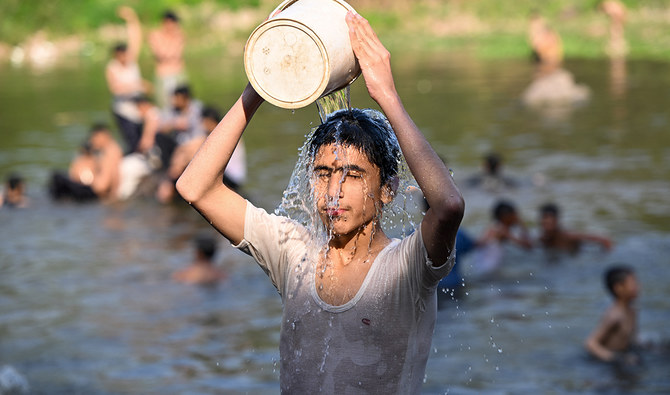ISLAMABAD: The National Disaster Management Authority has predicted dust and thunderstorms as well as isolated rain in upper parts of the country from today, Tuesday, until June 1, saying an ongoing “severe” heat wave would likely subside in some parts of the country.
Pakistan’s disaster management authority warned earlier this month temperatures in certain areas of Pakistan’s southern Sindh and eastern Punjab provinces could surge to 40 degrees Celsius between May 15-30. The Provincial Disaster Management Authority (PDMA) warned of an “intense” heat wave in the southern districts of Punjab, with severe risk identified in Bahawalpur, Rahim Yar Khan, Dera Ghazi Khan and Multan districts from May 21 to May 27.
Temperatures rose above 52 degrees Celsius (125.6 degrees Fahrenheit) in Pakistan’s southern province of Sindh, the highest reading of the summer and close to the country’s record high amid an ongoing heat wave, the met office said on Monday.
“Pakistan Meteorological Department (PMD) has forecasted that a westerly wave is likely to enter western parts of the country from 28th May 2024 and likely to grip upper parts on 1st June 2024,” the NDMA said in an advisory released on Monday, listing districts in the country where thunder and dust storms and rains were expected this week.
In the northern regions of the country like the Khyber Pakhtunkhwa province as well as Gilgit-Baltistan and Azad Kashmir, the NDMA predicted that heavy rainfall and thunderstorms could disrupt roads, electricity and other utilities between May 28 and June 1.
“Heavy Rainfall may generate flash flooding in local nullahs / streams and river tributaries. Landslides, mudslides, may lead to potential road blockages in Upper Khyber Pakhtunkhwa, Galiyat, Murree, Gilgit Baltistan and State of AJ&K,” the NDMA said. “Windstorms / Hailstorms may damage crops, loose structures, etc. Thunderstorms to increase risk of lightning strikes.”
The authority advised farmers and tourists to remain cautious during the spell.
The NDMA also predicted that heavy rainfall could cause flash floods in the southwestern Balochistan province, as well as land and mudslides that could block roads and disrupt power, and wind and hailstorms that could damage crops and loose structures.
In the provinces of Punjab and Sindh as well as the Islamabad Capital Territory, hill torrents are expected in DG Khan and Rajanpur.
“Heavy Rainfall may generate flash flooding in local nullahs / streams and river tributaries. Windstorms / Hailstorms may damage crops, loose structures, etc,” the NDMA said. “Thunderstorms to increase risk of lightning strikes. Electricity / other utility services may get disrupted.”
Addressing a press conference last week, the Prime Minister’s Coordinator on Climate Change Romina Khurshid Alam said 26 districts of the country were in the grips of a heat wave since May 21.
Alam said the first wave would last till May 30, the second would begin from June 7-8 and the third one in the last week of June. May and June were recorded as the “hottest and driest” with higher monthly average temperatures, she added, appealing to the masses, especially children and elderly, to adopt preventive measures.
She noted that the severity of heat waves had increased rapidly during the past few months with 13 districts of Sindh, nine of Punjab and four districts of Balochistan experiencing “severe heat.”
“Harsh weather is likely to persist at least till June 3. There is no possibility for respite, at least for Sindh. The heat spell may break in parts of Punjab but that, too, after June 4,” the chief meteorologist said last week.
Increased exposure to heat, and more heat waves, have been identified as one of the key impacts of climate change in Pakistan, with people experiencing extreme heat and seeing some of the highest temperatures in the world in recent years. The South Asian country of more than 241 million, one of the ten most vulnerable nations to climate change impacts, has also recently witnessed untimely downpours, flash floods and droughts.
Climate change-induced extreme heat can cause illnesses such as heat cramps, heat exhaustion, heatstroke, and hyperthermia. It can make certain chronic conditions worse, including cardiovascular, respiratory, and cerebrovascular disease and diabetes-related conditions, and can also result in acute incidents, such as hospitalizations due to strokes or renal disease.
According to the Global Climate Risk Index, nearly 10,000 Pakistanis died while the country has suffered economic losses worth $3.8 billion due to climate change impacts between 1999 and 2018. A deadly heat wave that hit Pakistan’s largest city of Karachi, the capital of Sindh, claimed 120 lives in 2015.
In 2022, torrential monsoon rains triggered the most devastating floods in Pakistan’s history, killing around 1,700 people and affecting over 33 million, a staggering number close to the population of Canada. Millions of homes, tens of thousands of schools and thousands of kilometers of roads and railways are yet to be rebuilt.


















